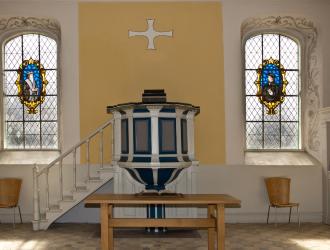
The Reformed Congregation
The Reformed Congregation is also known as Calvinists or Huguenots. They belong to a branch of Protestantism who were inspired by reformators such as Calvin and Ulrich Zwingli.The Huguenots primarily came from Catholic France but were persecuted and migrated in the 1680s and thus settled in Brandenburg from which they migrated further on to Fredericia.

The town of Fredericia was founded in 1650 but due to warfare and a lack of (financial) resources it was difficult to attract well-to-do citizens to the town. King Frederic the 4th therefore decided to invite a group of Reformed to settle in Fredericia in 1719. They had a reputation of being both virtuous and hardworking – two characteristics which Frederic the 4th sought for to Fredericia.
In 1720-22 around 70 families from Brandenburg came to the town and they were granted special privileges and were offered land in and around Fredericia. The Reformed founded their own congregation and in 1736 they could inaugurate their own church and churchyard. From 1821 the domain of the church was expanded by a school.
The Reformed differed themselves from other foreign faiths by emigrating as a unified group. To this day the Reformed Church and congregation is a living memory of Fredericia´s status as a religious free town and many of the citizens of the town still bear family names such as Lefevre and Deleuran which reflect their French origin.